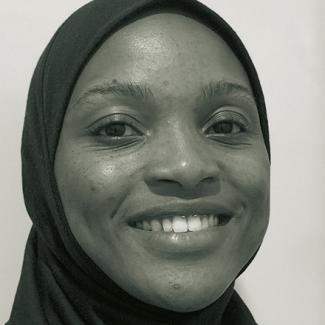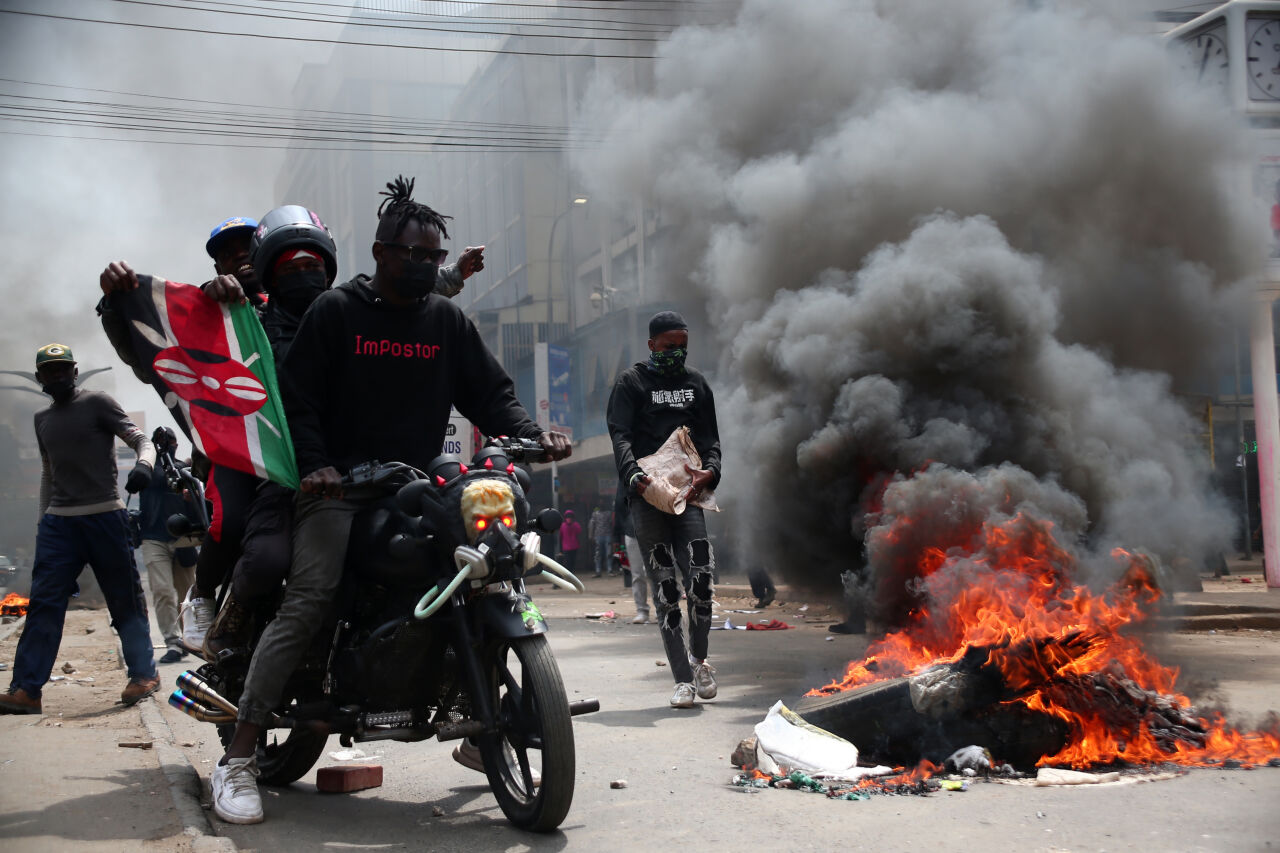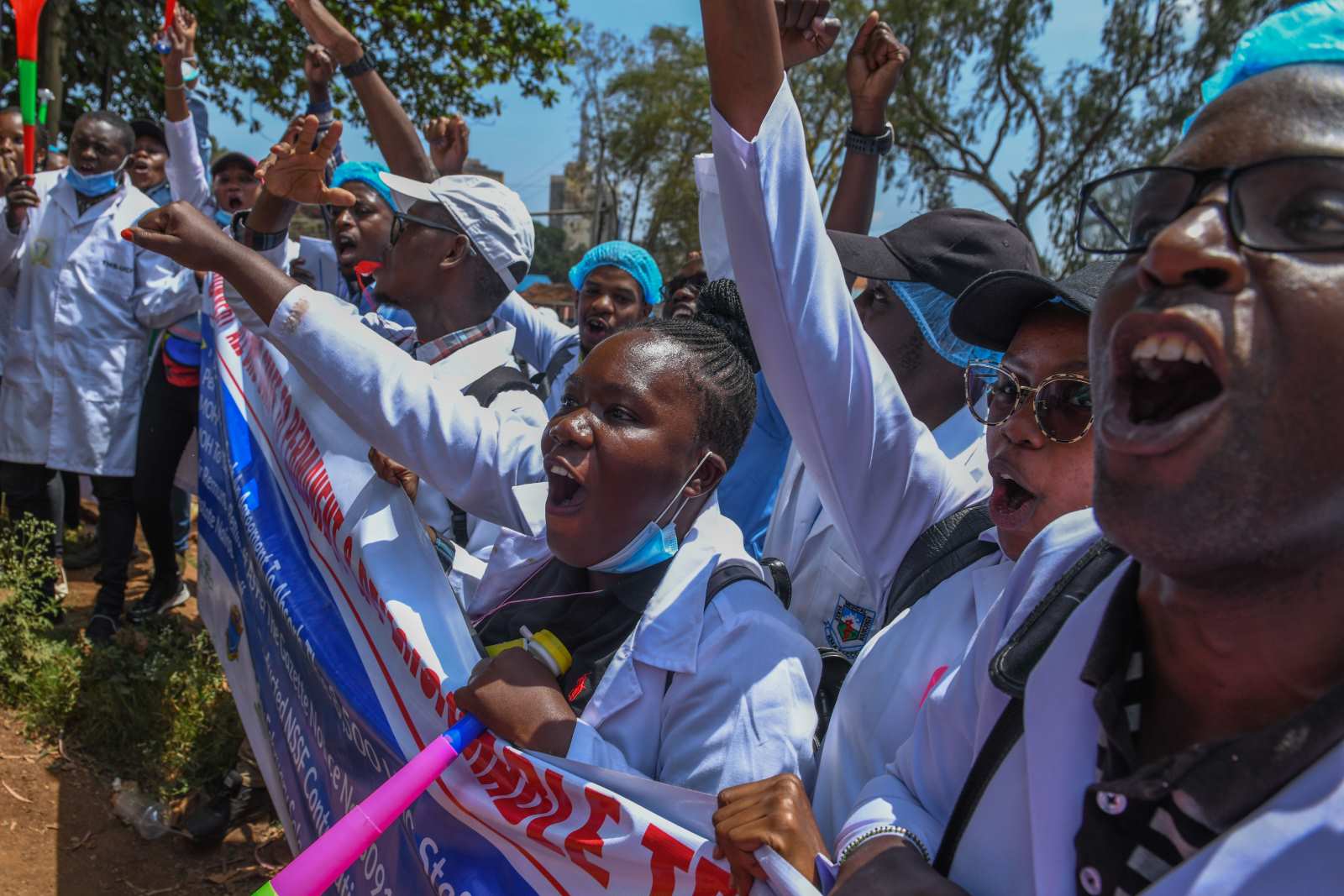Youth movements
“I am angry because Kenya is not working for many of its citizens”

What motivated you to join the recent youth protests in Kenya?
Well, it was the finance bill 2024. I wasn’t really interested in what was happening in politics before. Then I saw that the public participation forums where citizens could comment on the finance bill were being completely ignored and started researching what exactly the bill entailed.
I was of course aware of the sad state of our country. The cost of living has skyrocketed. Health services are poor. The public education system does not work. Many places lack sanitation, clean water and electricity. When I saw how much money was being spent on the luxuries for the political class instead of serving people’s needs, I became angry.
Kenya is struggling with debt and needs to increase state revenues.
Yes, but government spending is unbalanced. For example, a lot of money was allocated to renovating the president’s residence. The First Lady’s Office gets budget money too, though she was not elected.
People assessed on social media what that money could do for citizens. Normally, the public gets an opportunity to discuss things before a bill becomes an active law. Because objections were completely ignored, we took to the streets. From day one, we experienced hostility from the police and arrogance from the members of parliament (MPs).
I am angry because Kenya is not working for many of its citizens. It is only working for a few in the political class, which is only serving itself instead of improving all of our lives.
What does it mean to be young in Kenya?
I am 30 years old, which is still young in Kenya. When you come from the middle class, you have some opportunities to develop yourself. You have social support, you can meet your basic needs and you can afford education.
But once you leave university, for example, there are hardly any job opportunities. To get one of the few that exist, you have to know someone or pay a bribe. Belonging to the middle class means you are nonetheless still privileged, because you won’t starve without a job as your family and other people will support you.
At the same time, there are masses of young people from poor backgrounds. They can barely make a living, let alone get good education. And then you hear that the government wants to increase taxes, even on staple food like bread or cooking oil.
Of those who can, many choose to leave the country. But I think as Kenyans we should have the opportunity to stay here and make the most of our lives here.
A video clip of you at the protests went viral. You were confronting a police officer. It turned you into a face of the movement. How did that happen and how did you feel facing the officer?
It was on the second day of the protests. I had been arrested by plain-clothes policemen on the first day after being separated from my friends. We went there as group for safety reasons. I was beaten and kicked and was detained at the central police station until 8pm. At that point, the independent Law Society of Kenya managed to negotiate the release for all of us – we were many.
The next day, I felt a lot of anger because of this experience. Then I was again approached by three policemen, and they seemed ready to beat me. I wondered why the police are on the wrong side. They should be supporting their fellow citizens. I was scared, but I told them that the protests were in support of our nation and that I was actually there to defend their rights too. I was lucky that people were filming. I don’t know what they would have done to me otherwise. That night, Larry Madowo from CNN posted the clip, and it went viral. My sister noticed it right away and tagged me, but I told her to untag me, I didn’t want to be associated with it. The next day, people nonetheless had somehow decided that I had become a face of the protest. Soon people were telling me during rallies: “We’re here because we saw this video.” So, I’m glad to have inspired people.
Now you have decided to accept the role, and you have started to give TV interviews. Do you worry about your safety?
Yes, I do. As we speak, I am staying at a friend’s house because they might look for me at home. I also no longer go to the gym where I work as a trainer as regularly. I have been told that I seem to be on a list of people the security forces are interested in.
I have a little son at home. I have told the nanny who is looking after him to stay indoors and not allow him to play outside. It is scary, but I try not to let fear get the better of me.
What role do social media play in the protests?
Sharing information is the key role of social media. If certain people hadn’t decided to inform the public of what is happening, many people would have remained in the dark.
Some people created posts and memes to spell out in simple terms what the government is planning to do and what it could do better. Social media also serve as a protection for us protesters. In my case, the police knew the situation was being filmed. But damage was also done. Some hacked into systems and exposed addresses, companies and mobile-phone numbers of MPs who had voted for the finance bill. Some people unfortunately went as far as to destroy company facilities or attack MPs’ homes. Others kept calling them non-stop on private lines.
But all in all, I don’t think we would have achieved as much if we hadn’t used social media. I think the government knows that too, because at one point, internet connections were jammed.
How did the most recent protests differ from previous ones?
The atmosphere was more hostile. The police seemed to be out for blood. When they use tear gas, they don’t usually aim at persons, but let the cannisters drop and explode somewhere. Last week, they pointed tear-gas guns at people. They fired rubber bullets and live ammunition indiscriminately.
It is disheartening that the government does not listen to the citizens but responds with such brutality.
How do you think the protest movement will develop? Will it need to elect leaders at some point? How will it ensure that it remains relevant?
I wonder how we can continue the protests, because they are no longer as impactful as they were at first. More and more people are being injured or even killed.
The government is now inviting to dialog. However, I am afraid this is a strategy that has been used again and again. They pick a few people, shake hands, and those people start to benefit personally from their new acquaintances. They are accommodated, and for everyone else things go on as before.
So, we do not want that kind of dialogue. What we need is obvious, but the government is going round in circles. It feels like the only way we can express ourselves is in protests. But given the brutality of the government, I fear we are caught between a rock and a hard place. It’s important that we keep meeting online to consider a way forward.
What’s next for Kenya?
I see a lot of grey areas. It’s not really clear whether the finance bill was withdrawn completely. It has now been replaced with the appropriations bill. Which does not say much on how the government is going to get additional money. And a lot of money is still being wasted.
The cabinet has been officially dismissed, but there is reason to believe that the same people will return, perhaps to different cabinet posts. President William Ruto has proven that he cannot be trusted.
It’s time to rebuild the nation, starting from scratch, with values and systems that we are convinced will work regardless of who is in office.
Shakira Wafula is a sports science student and an active citizen.
sfitermined@gmail.com











